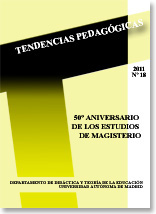Keywords:
Equity in education, Equity and gender, Indicators of inequality between men and women, Gender perspective.Abstract
This paper aims at showing the complexity of gender inequality both at global and our cultural level, using data from complementary sources and research areas, and taking the ancestral inequality in the sharing of power in the different paths of life as the main explanatory hypothesis of such inequality. The educational, professional and social inferiority situation of women is both a cause and a consequence of such inequalities. Introducing the gender perspective in the social systems seems to be the best way forward to achieve equity, necessary for sustainable development, knowledge advance and democratic development. It is also an imperative for the legislation of developed countries and a priority of the Millenium Development Goals and of Education for All.Downloads
References
Clance, P.R. (1985) The impostor phenomenon. New Woman. 15, 40-43.
Comisión Europea (1999) Mujeres y ciencia. Movilizar a las mujeres en beneficio de la investigación científica. Comunicado de la Comisión Europea 17/2/1999.
Comisión Europea (2004) Women in industrial research. Speeding up changes in Europe. Disponible en http://ec.europa.eu/research/sciencesociety/women/wir/index_en.html.
Commission of the European Communities (2005) Women and Science: Excellence and Innovation - Gender Equality in Science, disponible en: http://www.amit-es.org/descarg/women&science_05.pdf.
Comisión Europea (2006) Año Europeo de la Igualdad de Oportunidades para todos (2007). Hacia una sociedad justa, disponible en http://www.europa.eu/scadplus/leg/es/cha/c10314.htm.
Dossier « Parité: où en est-on? » (2005) Service Public, nº III, marzo, pp. 16-25.
Fundación Española para la Ciencia y la Tecnología (2005) Mujer y ciencia. La situación de las mujeres investigadoras en el sistema español de ciencia y tecnología. Madrid: FECYT.
GARCÍA DE CORTÁZAR, M. y GARCÍA DE LEÓN, M. A. (1997) Mujeres en minoría. Una investigación sociológica sobre las catedráticas de universidad en España. Opiniones y actitudes (16), CIS. 1-67.
García de León, M. A. (2002) Herederas y heridas. Sobre las élites profesionales femeninas. Madrid: Ediciones Cátedra.
Gómez Esteban, C.; Callejo Gallego, J.; y Casado Aparicio, E. (2004) El techo de cristal en el sistema educativo español. Madrid: UNED Ediciones.
INSTITUTO NACIONAL DE ESTADÍSTICA (2006) Mujeres y hombres en España 2006. Madrid: INE.
Instituto de la Mujer (2008): Las mujeres en cifras: 1993-2008. Disponible en:
http://www.inmujer.migualdad.es/mujer/publicaciones/docs/Mujeres%20en%20cifras%201983_2008.pdf
INSTRAW (2005) Educación y capacitación de la mujer: Nuevos retos. United Nations International Research and Training Institute for the Advancement of Women. Elaborado por Jackie Kirk. Centro UNESCO. Universidad de Ulster.
KINCHELOE, J. L. Y STEINBERG, S. R. (1999). Repensar el
multiculturalismo. Barcelona: Octaedro.
Laporta, J. (2008) ¿Pueden criticarse las políticas de género? El País. 14/08/2008. La cuarta página.
Ley Orgánica 3/2007, de 15 de marzo de 2007, para la igualdad efectiva de mujeres y hombres. BOE, 23/03/07.
Ley Orgánica 4/2007, de 12 de abril DE 2007, que modifica la Ley Orgánica de Universidades. BOE, 13 de abril de 2007.
López Sáez, M. (2003), “Universidad”, en Trayectorias personales y profesionales de mujeres con estudios tradicionalmente masculinos. Madrid: CIDE/Instituto de la Mujer, 160-267.
Martín Serrano, M. (Dir.); Algarra Paredes, A.; Mangas, L. y Fernández
Cornejo, J. A. (2004) La situación profesional de la mujer en las administraciones públicas. EURODOXA. Madrid: INAP/Instituto de la Mujer.
Ministerio de Administraciones Públicas (2006) Boletín Estadístico del personal al servicio de las Administraciones Públicas. Madrid: MAP.
Ministerio de Educación y Ciencia. Datos disponibles en
www.mec.es/universidades/estadísticas.
Organización de las Naciones Unidas (2000) Declaración del Milenio. Nueva Cork: Naciones Unidas. Disponible en
http://www.un.org/spanish/millenniumgoals/.
Organización de las Naciones Unidas (2005): Objetivos de desarrollo del Milenio Informe de 2005. Naciones Unidas: Nueva York. Disponible en http://www.un.org/spanish/millenniumgoals/.
UNESCO (1990), Declaración Mundial sobre Educación para Todos y Marcos de Acción para satisfacer las Necesidades Básicas de Aprendizaje. Jomtien: Inter.-Agency Comisión.
UNESCO (1996) Conferencia Mundial sobre la Mujer. Beijing (China): UNESCO
Wenneras, C. y Wold, A. (1997): "Nepotism and Sexism in Peer Review". Nature. Vol. 387, 341-343.
